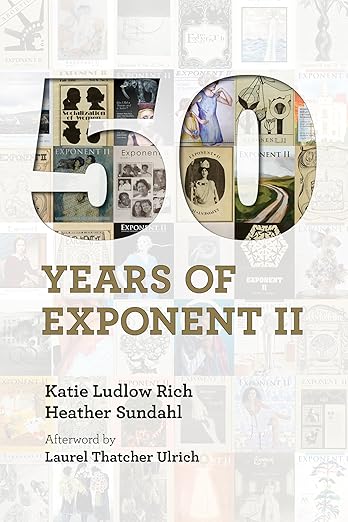Of the sessions I attended at Sunstone earlier this month, the most illuminating was on the Latter-day women’s magazine, the Exponent II.*
Katie Ludlow Rich and Heather Sundahl, authors of Fifty Years of Exponent II, described how the unofficial, unsanctioned Mormon feminist magazine launched and, more importantly, continued until this day, with subscriptions increasing.
What I found most poignant was how the editors of the first edition proudly sent copies to each General Authority, assuming that these men would welcome first-hand insight into women’s concerns. Instead, they were told never to be so presumptuous as to send their thoughts to their leaders, and soon there began a campaign, often mediated from leaders through editors’ husbands, to discourage publication; a leader questioned whether the Church wasn’t keeping these women busy enough. (How different things might have been had these male Church leaders lived up to feminine expectations.)
One reason that the homespun women’s magazine garnered such attention from Church authorities was that the lead editor, Claudia Bushman, was married to a stake president, and she had been quoted in a Boston newspaper saying that many Church members felt uncomfortable with the Church’s ban against Blacks holding the priesthood or receiving temple ordinances. Bushman ended up resigning her editorship, a move that the authors frame as a selfless act, allowing the magazine to slip back under the Brethren’s radar and continue to be an outlet for the Church’s gender minorities. Had that not happened, Rich and Sundahl speculate, the Exponent II might have faced too much persecution to survive. (Add 8/28: and of course, it helped that the focus was on lived experience and reflections, generally sidestepping flat-out theological arguments.)
That staying power is all the more impressive considering that lots of feminist publications started up in the 1970s, and almost all of them had a lifespan of under five years. Why was the Exponent II so different? Authors Rich and Sundahl put it down to two things, both unintended, indirect consequences of that hostile reception. When Church leaders advised them to desist, they decided collectively to fast and pray about what they should do. Afterwards, they gathered again and resolved to keep publishing. But that period of reflection had built both a sense of purpose and a sense of community. Or, as Exponent II president Lori LeVar Pierce explained on Richard Oster’s Podcast, to tell their stories so that others might learn from them.
Over and over again, authors of the book explained that those putting together Exponent II “chose community over ideological purity,” and so it thrived. That’s a lesson we can take into our daily actions.
The book is rolling out through September, with an online launch party on August 29 (register here) as well as other events and fundraisers.
*There had been an earlier Woman’s Exponent from 1872 to 1914, edited by Mormon and suffragette Emmeline B Wells.

So disappointing (yet predictable in hindsight) about the reaction from LDS leaders. When I came out as gay in the late 1980s, I sent a letter to each apostle explaining the things I’d learned, believing that the official stance existed because these old guys had been taught misinformation early in their lives. Once they understood facts, they could adjust their position. Gordon B. Hinckley wrote me back, his letter filled with more misinformation and logical fallacies. I was dumbstruck. But now, I understand there was never going to be a different reaction to facts by these men. I hope that with the persistence of the Exponent II, women will eventually get to do more than hand out towels in the temple and wear pants once in a while. (Or have I missed some other huge breakthrough?)
“…a leader questioned whether the Church wasn’t keeping these women busy enough.” (Eye-roll) How predictable. So glad Exponent II continues to thrive!
@Donna, as I was writing this, I was thinking it is yet another variety of how so many rank-and-file Mormons are better than their leaders, and yet leaders expect the lessons to always flow the other way
@Johnny Wow! But you are not alone. Gary Watts’ campaign to educate Mormon leaders how anti-LGBTQ stances hurt families is heart-breaking. Eloquence (and truth) on stopped up ears. https://www.associationmormonletters.org/reviews/older-reviews/watts-rainbow-letters-the-temerity-to-believe-reviewed-by-monya-baker/
Thank you for reading!
I wish I’d been able to attend the session. I’m always impressed by the people who keep trying to improve the CoJCoL-dS — despite the leaders’ attempts to squash them!